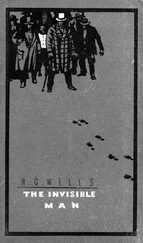Robert Silverberg - To See the Invisible Man
Здесь есть возможность читать онлайн «Robert Silverberg - To See the Invisible Man» весь текст электронной книги совершенно бесплатно (целиком полную версию без сокращений). В некоторых случаях можно слушать аудио, скачать через торрент в формате fb2 и присутствует краткое содержание. Год выпуска: 2007, ISBN: 2007, Издательство: Subterranean Press, Жанр: Фантастика и фэнтези, на английском языке. Описание произведения, (предисловие) а так же отзывы посетителей доступны на портале библиотеки ЛибКат.
- Название:To See the Invisible Man
- Автор:
- Издательство:Subterranean Press
- Жанр:
- Год:2007
- ISBN:978-1-59606-089-0
- Рейтинг книги:5 / 5. Голосов: 1
-
Избранное:Добавить в избранное
- Отзывы:
-
Ваша оценка:
- 100
- 1
- 2
- 3
- 4
- 5
To See the Invisible Man: краткое содержание, описание и аннотация
Предлагаем к чтению аннотацию, описание, краткое содержание или предисловие (зависит от того, что написал сам автор книги «To See the Invisible Man»). Если вы не нашли необходимую информацию о книге — напишите в комментариях, мы постараемся отыскать её.
To See the Invisible Man — читать онлайн бесплатно полную книгу (весь текст) целиком
Ниже представлен текст книги, разбитый по страницам. Система сохранения места последней прочитанной страницы, позволяет с удобством читать онлайн бесплатно книгу «To See the Invisible Man», без необходимости каждый раз заново искать на чём Вы остановились. Поставьте закладку, и сможете в любой момент перейти на страницу, на которой закончили чтение.
Интервал:
Закладка:
I was unable to analyze it. But it felt as though a clammy hand had seized my throat. I left quickly. The smell of soapy water stung my nostrils for hours afterward, and the sight of pink flesh haunted my dreams that night. I ate alone, in one of the automatics. I began to see that the novelty of this punishment was soon lost.
In the third week I fell ill. It began with a high fever, then pains of the stomach, vomiting, the rest of the ugly symptomatology. By midnight I was certain I was dying. The cramps were intolerable, and when I dragged myself to the toilet cubicle I caught sight of myself in the mirror, distorted, greenish, beaded with sweat. The mark of invisibility stood out like a beacon in my pale forehead.
For a long time I lay on the tiled floor, limply absorbing the coolness of it. Then I thought: What if it’s my appendix? That ridiculous, obsolete, obscure prehistoric survival? Inflamed, ready to burst?
I needed a doctor.
The phone was covered with dust. They had not bothered to disconnect it, but I had not called anyone since my arrest, and no one had dared call me. The penalty for knowingly telephoning an invisible man is invisibility. My friends, such as they were, had stayed far away.
I grasped the phone, thumbed the panel. It lit up and the directory robot said, “With whom do you wish to speak, sir?”
“Doctor,” I gasped.
“Certainly, sir.” Bland, smug mechanical words! No way to pronounce a robot invisible, so it was free to talk to me!
The screen glowed. A doctorly voice said, “What seems to be the trouble?”
“Stomach pains. Maybe appendicitis.”
“We’ll have a man over in—” He stopped. I had made the mistake of upturning my agonized face. His eyes lit on my forehead mark. The screen winked into blackness as rapidly as though I had extended a leprous hand for him to kiss.
“Doctor,” I groaned.
He was gone. I buried my face in my hands. This was carrying things too far, I thought. Did the Hippocratic Oath allow things like this? Could a doctor ignore a sick man’s plea for help?
Hippocrates had not known anything about invisible men. A doctor was not required to minister to an invisible man. To society at large I simply was not there. Doctors could not diagnose diseases in nonexistent individuals.
I was left to suffer.
It was one of invisibility’s less attractive features. You enter a bathhouse unhindered, if that pleases you—but you writhe on a bed of pain equally unhindered. The one with the other, and if your appendix happens to rupture, why, it is all the greater deterrent to others who might perhaps have gone your lawless way!
My appendix did not rupture. I survived, though badly shaken. A man can survive without human conversation for a year. He can travel on automated cars and eat at automated restaurants. But there are no automated doctors. For the first time, I felt truly beyond the pale. A convict in a prison is given a doctor when he falls ill. My crime had not been serious enough to merit prison, and so no doctor would treat me if I suffered. It was unfair. I cursed the devils who had invented my punishment. I faced each bleak dawn alone, as alone as Crusoe on his island, here in the midst of a city of twelve million souls.
How can I describe my shifts of mood, my many tacks before the changing winds of the passing months?
There were times when invisibility was a joy, a delight, a treasure. In those paranoid moments I gloried in my exemption from the rules that bound ordinary men.
I stole. I entered small stores and seized the receipts, while the cowering merchant feared to stop me, lest in crying out he make himself liable to my invisibility. If I had known that the State reimbursed all such losses, I might have taken less pleasure in it. But I stole.
I invaded. The bathhouse never tempted me again, but I breached other sanctuaries. I entered hotels and walked down the corridors, opening doors at random. Most rooms were empty. Some were not.
Godlike, I observed all. I toughened. My disdain for society—the crime that had earned me invisibility in the first place—heightened.
I stood in the empty streets during the periods of rain, and railed at the gleaming faces of the towering buildings on every side. “Who needs you?” I roared “Not I! Who needs you in the slightest?”
I jeered and mocked and railed. It was a kind of insanity, brought on, I suppose, by the loneliness. I entered theaters—where the happy lotus-eaters sat slumped in their massage chairs, transfixed by the glowing tridim images—and capered down the aisles. No one grumbled at me. The luminescence of my forehead told them to keep their complaints to themselves, and they did.
Those were the mad moments, the good moments, the moments when I towered twenty feet high and strode among the visible clods with contempt oozing from every pore. Those were insane moments—I admit that freely. A man who has been in a condition of involuntary invisibility for several months is not likely to be well balanced.
Did I call them paranoid moments? Manic depressive might be more to the point. The pendulum swung dizzily. The days when I felt only contempt for the visible fools all around me were balanced by days when the isolation pressed in tangibly on me. I would walk the endless streets, pass through the gleaming arcades, stare down at the highways with their streaking bullets of gay colors. Not even a beggar would come up to me. Did you know we had beggars, in our shining century? Not till I was pronounced invisible did I know it, for then my long walks took me to the slums, where the shine has worn thin, and where shuffling stubble-faced old men beg for small coins.
No one begged for coins from me. Once a blind man came up to me.
“For the love of God,” he wheezed, “help me to buy new eyes from the eye bank.”
They were the first direct words any human being had spoken to me in months. I started to reach into my tunic for money, planning to give him every unit on me in gratitude. Why not? I could get more simply by taking it. But before I could draw the money out, a nightmare figure hobbled on crutches between us. I caught the whispered word, “Invisible,” and then the two of them scuttled away like frightened crabs. I stood there stupidly holding my money.
Not even the beggars. Devils, to have invented this torment!
So I softened again. My arrogance ebbed away. I was lonely, now. Who could accuse me of coldness? I was spongy soft, pathetically eager for a word, a smile, a clasping hand. It was the sixth month of my invisibility.
I loathed it entirely, now. Its pleasures were hollow ones and its torment was unbearable. I wondered how I would survive the remaining six months. Believe me, suicide was not far from my mind in those dark hours.
And finally I committed an act of foolishness. On one of my endless walks I encountered another Invisible, no more than the third or the fourth such creature I had seen in my six months. As in the previous encounters, our eyes met, warily, only for a moment. Then he dropped his to the pavement, and he sidestepped me and walked on. He was a slim young man, no more than forty, with tousled brown hair and a narrow, pinched face. He had a look of scholarship about him, and I wondered what he might have done to merit his punishment, and I was seized with the desire to run after him and ask him, and to learn his name, and to talk to him, and embrace him.
All these things are forbidden to mankind. No one shall have any contact whatsoever with an Invisible—not even a fellow Invisible. Especially not a fellow Invisible. There is no wish on society’s part to foster a secret bond of fellowship among its pariahs.
I knew all this.
I turned and followed him, all the same.
For three blocks I moved along behind him, remaining twenty to fifty paces to the rear. Security robots seemed to be everywhere, their scanners quick to detect an infraction, and I did not dare make my move. Then he turned down a side street, a gray, dusty street five centuries old, and began to stroll, with the ambling, going-nowhere gait of the Invisible. I came up behind him.
Читать дальшеИнтервал:
Закладка:
Похожие книги на «To See the Invisible Man»
Представляем Вашему вниманию похожие книги на «To See the Invisible Man» списком для выбора. Мы отобрали схожую по названию и смыслу литературу в надежде предоставить читателям больше вариантов отыскать новые, интересные, ещё непрочитанные произведения.
Обсуждение, отзывы о книге «To See the Invisible Man» и просто собственные мнения читателей. Оставьте ваши комментарии, напишите, что Вы думаете о произведении, его смысле или главных героях. Укажите что конкретно понравилось, а что нет, и почему Вы так считаете.












